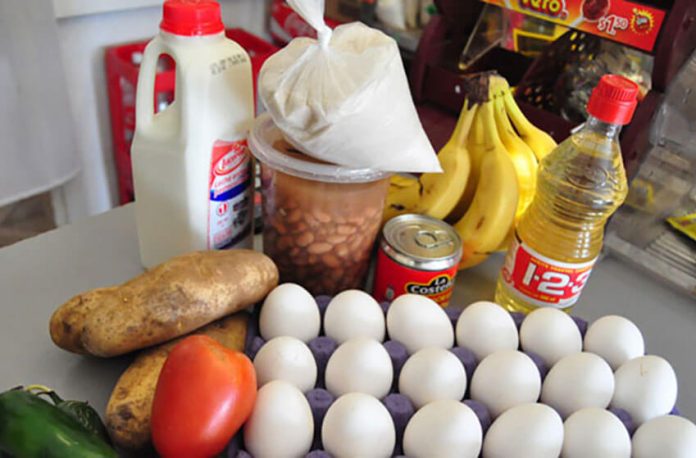The prices of 17 basic products increased over the past three months despite the federal government’s announcement of a six-month anti-inflation plan in early May.
President López Obrador announced May 4 that the government had reached an agreement with the private sector to ensure fair prices for 24 products in the canasta básica, a selection of basic foodstuffs including beans, rice, eggs and sugar.
The plan, formally called the Packet against Inflation and High Prices (PACIC), and successive interest rate hikes have been unable to curb inflation, which reached a 21-year high of 7.99% in June – more than double the central bank’s 3% target. Food prices were up by an even higher 13.4%, according to data from the national statistics agency INEGI.
Of the 17 basic products whose prices increased between April and June, oranges recorded the biggest hike. Their price rose 49.7% in the space of just three months, while potatoes were 44.2% more expensive at the end of June.
The other 15 products whose prices rose were:
- Tomatoes +7%
- Bread +5.1%
- Vegetable oil +4.9%
- Eggs +4.3%
- Chicken +4.3%
- Pork chops +3.6%
- Pasta for soup +2.8%
- Toilet paper +2.5%
- Canned tuna and sardines +2.4%
- Soap +2.3%
- Milk +2.2%
- Corn tortillas +1.7%
- Beans +1.2%
- Rice +1%
- Beefsteak +0.6%
In contrast, prices for limes, onions, fresh chiles, sugar, carrots and apples all decreased over the past three months, although the reductions were minimal in the cases of the last three. Limes, whose price was up more than 150% in annual terms in January, easily recorded the biggest reduction, with their cost dropping 48% between April and June. The price of onions declined 24% while chiles were 2% cheaper at the end of last month.
Luis Adrián Muñiz, deputy director of economic analysis at the brokerage firm Vector, said that PACIC has had almost no impact on prices. One of its key tenets is the promotion of increased production of staple foods, but boosting output will take time.
The only way to reduce prices in the short term is to introduce price controls, Muñiz said, but caps are not desirable due to the distortions they would likely generate in the market.
After the government floated the possibility of placing price controls on basic food items earlier this year, analysts warned that such a measure could create shortages because production is discouraged.
James Salazar, an economist with CI Banco, agreed that “in terms of curbing inflationary pressures, the reach of PACIC is very limited.”
The only effective inflation-fighting measure has been the gasoline subsidy, “but its cost is very high,” he said. Reducing inflation by boosting supply of consumer products will take a considerable amount of time, Salazar added.
“What could help is a reduction in inflation in the United States or a decrease in the international prices of some supplies, which is seen now in the case of some metals and agricultural products without it yet being a trend. This would bring a greater benefit than [that brought by] any government measure that seeks to suppress inflation,” he said.
The central bank predicted in late June that headline inflation, which doesn’t strip out volatile food and energy prices, will increase to 8.1% in the third quarter before falling to 7.5% in Q4. It forecasts further declines in all four quarters of next year, with an anticipated headline rate of 3.2% at the end of next year and 3.1% in Q1 and Q2 of 2024.
In addition to inflationary shocks stemming from the pandemic, the Bank of México said there were inflationary pressures associated with Russia’s invasion of Ukraine and strict lockdown measures imposed by China to slow the spread of the coronavirus. Widespread drought in Mexico has also affected the availability – and prices – of some fresh food items.
The Vector brokerage house similarly predicts that inflation will peak at 8.2% this quarter before it begins to slowly fall. Citibanamex chief economist Adrián de la Garza also anticipates a peak in the July-September quarter, as well as stubbornly high inflation in the last three months of the year.
“We think that inflation will peak in around August or September and it should remain at levels of about 7.5-8% for the rest of the year,” he said.
Following are products that have recorded the biggest price increases in the 12 months ending June 30.
- Avocado +79%
- Onions +57%
- Potatoes +49%
- Poblano chiles +37%
- Cooking oil +33%
- Wheat flour +28%
- Zucchini +26%
- Oranges +25%
- White bread +25%
- Cucumber +24%
- Eggs +24%
- Watermelon +23%
- Chicken +18%
- Pineapple +16%
- Beef +15%
- Fish +14%
With reports from El Universal
